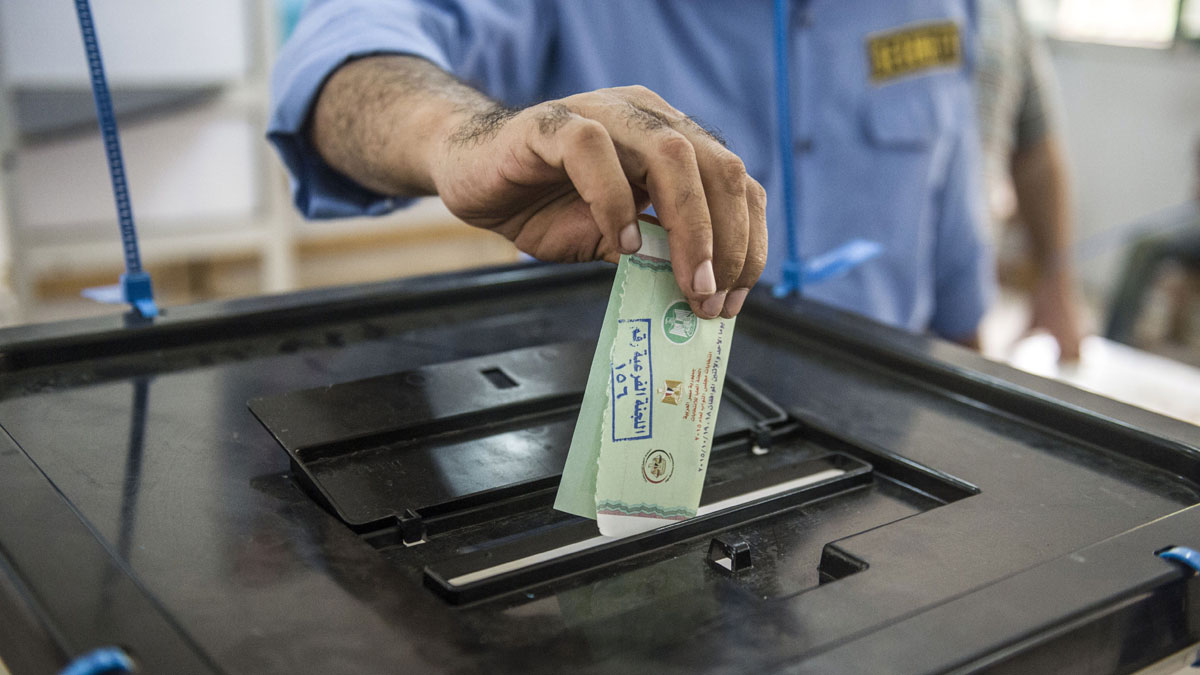Egypt elections: turnout low as voters go to the polls
President Sisi's camp looks set to dominate elections thanks to a weak opposition

A free daily email with the biggest news stories of the day – and the best features from TheWeek.com
You are now subscribed
Your newsletter sign-up was successful
Egypt's parliamentary elections are underway, with voter turnout extremely low so far. The two-part elections started on Sunday and will go on throughout today, with polls open in 14 of Egypt's 27 governorates – the other 13 will vote on 21 November.
Should the elections be conclusive, Egypt will have its first parliament in three years this December (the last parliament dissolved in June 2012 after previous elections were deemed unconstitutional). Since then, President Abdul Fattah al-Sisi has held all legislative powers.
Previous election troubles and the ousting of the democratically elected President Mohammed Morsi in 2013 have meant that people's faith in the election process and in Egypt's president Sisi has turned sour. Polling stations appear to back this up, with numbers from Sunday barely reaching ten per cent, says The Guardian. "With an absence of opposition parties – such as the now-banned Muslim Brotherhood, which has faced a deadly government crackdown overseen by Sisi – the poll has not inspired the enthusiasm witnessed for Egypt's first democratic elections in 2011," says the newspaper.
The Week
Escape your echo chamber. Get the facts behind the news, plus analysis from multiple perspectives.

Sign up for The Week's Free Newsletters
From our morning news briefing to a weekly Good News Newsletter, get the best of The Week delivered directly to your inbox.
From our morning news briefing to a weekly Good News Newsletter, get the best of The Week delivered directly to your inbox.
In Al-Ahram, Egypt's widely read government-owned newspaper, one voter asks: "Why would I want to take part in this fake electoral process that is designed only to make the president, who came to power by removing an elected president, look legitimate?"
Even so, says the BBC, nobody is expecting anything less than a "resounding" win for a parliament loyal to Sisi. "While many candidates are standing as 'independents', they're likely to be loyal to one of the coalitions which will dominate the new parliament," it says.
The new parliament will have more legislative powers than before, including a prime minister veto, but with opposition weak, president Sisi won't encounter much resistance for his own agenda.
Despite the low turnout, police are still out in force throughout Egypt, for fear of disruptions from pro-Morsi supporters and Islamists. According to Al-Ahram, there are 120,000 police officers and central security forces for 18,945 polling stations, and 185,000 army personnel deployed throughout the country.
A free daily email with the biggest news stories of the day – and the best features from TheWeek.com
Currently, there is a 500 Egyptian pound (£40) fine for anyone who fails to vote without good reason, but many Egyptians remain sceptical about it being enforced.
-
 The EU’s war on fast fashion
The EU’s war on fast fashionIn the Spotlight Bloc launches investigation into Shein over sale of weapons and ‘childlike’ sex dolls, alongside efforts to tax e-commerce giants and combat textile waste
-
 How to Get to Heaven from Belfast: a ‘highly entertaining ride’
How to Get to Heaven from Belfast: a ‘highly entertaining ride’The Week Recommends Mystery-comedy from the creator of Derry Girls should be ‘your new binge-watch’
-
 The 8 best TV shows of the 1960s
The 8 best TV shows of the 1960sThe standout shows of this decade take viewers from outer space to the Wild West
-
 Epstein files topple law CEO, roil UK government
Epstein files topple law CEO, roil UK governmentSpeed Read Peter Mandelson, Britain’s former ambassador to the US, is caught up in the scandal
-
 Iran and US prepare to meet after skirmishes
Iran and US prepare to meet after skirmishesSpeed Read The incident comes amid heightened tensions in the Middle East
-
 Israel retrieves final hostage’s body from Gaza
Israel retrieves final hostage’s body from GazaSpeed Read The 24-year-old police officer was killed during the initial Hamas attack
-
 China’s Xi targets top general in growing purge
China’s Xi targets top general in growing purgeSpeed Read Zhang Youxia is being investigated over ‘grave violations’ of the law
-
 Panama and Canada are negotiating over a crucial copper mine
Panama and Canada are negotiating over a crucial copper mineIn the Spotlight Panama is set to make a final decision on the mine this summer
-
 Why Greenland’s natural resources are nearly impossible to mine
Why Greenland’s natural resources are nearly impossible to mineThe Explainer The country’s natural landscape makes the task extremely difficult
-
 Iran cuts internet as protests escalate
Iran cuts internet as protests escalateSpeed Reada Government buildings across the country have been set on fire
-
 US nabs ‘shadow’ tanker claimed by Russia
US nabs ‘shadow’ tanker claimed by RussiaSpeed Read The ship was one of two vessels seized by the US military